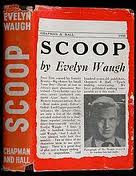This seemed an old-fashioned book to me, and Evelyn Waugh did pride himself on being ‘two hundred years behind the times’. ‘Scoop’ was written long before political correctness, and there’s a strong sense of Britannia ruling the waves. I wasn’t sure how much of this was satire, or Waugh himself.
Some things don’t change though – Newspaper magnates like Lord Copper still ring true, and recent phone tapping scandals show the desperate measures that some journalists still take to create news.
I liked the character of the innocent journalist William Boot, who was far more at home writing essays on badgers than acting as The Daily Beast’s war correspondent. The telegrams flying between a bemused Boot and his newspaper are really funny, as are Boot’s experiences courtesy of his massive amount of weird and wonderful luggage. The inspiration may have come from the famous Bill Deedes, who reported on the Second Italo-Abyssinian War with Evelyn Waugh. Apparently, Bill Deedes arrived in Addis Ababa, aged 22, with almost 600 pounds of luggage.
Although this was a clever and amusing book, I didn’t feel much warmth for it. I thought it was a great concept, but the style and writing did put me off in places. The Book Group thought it was a 3 - 3 and a half star read.
Some things don’t change though – Newspaper magnates like Lord Copper still ring true, and recent phone tapping scandals show the desperate measures that some journalists still take to create news.
I liked the character of the innocent journalist William Boot, who was far more at home writing essays on badgers than acting as The Daily Beast’s war correspondent. The telegrams flying between a bemused Boot and his newspaper are really funny, as are Boot’s experiences courtesy of his massive amount of weird and wonderful luggage. The inspiration may have come from the famous Bill Deedes, who reported on the Second Italo-Abyssinian War with Evelyn Waugh. Apparently, Bill Deedes arrived in Addis Ababa, aged 22, with almost 600 pounds of luggage.
Although this was a clever and amusing book, I didn’t feel much warmth for it. I thought it was a great concept, but the style and writing did put me off in places. The Book Group thought it was a 3 - 3 and a half star read.
Pam











